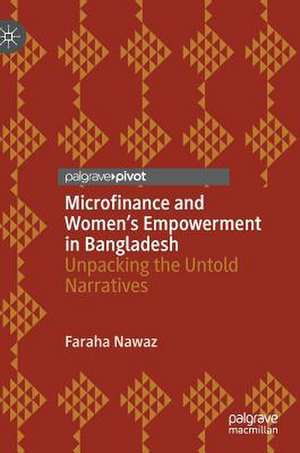Microfinance and Women’s Empowerment in Bangladesh: Unpacking the Untold Narratives
Autor Faraha Nawazen Limba Engleză Hardback – 12 mar 2019
Microfinance and Women’s Empowerment in Bangladesh will be of interest to students and scholars across a range of disciplines, including Gender Studies, Development Studies, and Politics.
Preț: 384.31 lei
Nou
Puncte Express: 576
Preț estimativ în valută:
73.55€ • 79.86$ • 61.78£
73.55€ • 79.86$ • 61.78£
Carte tipărită la comandă
Livrare economică 23 aprilie-07 mai
Preluare comenzi: 021 569.72.76
Specificații
ISBN-13: 9783030135386
ISBN-10: 3030135381
Pagini: 128
Ilustrații: XIII, 127 p. 17 illus., 16 illus. in color.
Dimensiuni: 148 x 210 x 16 mm
Greutate: 0.33 kg
Ediția:1st ed. 2019
Editura: Springer International Publishing
Colecția Palgrave Pivot
Locul publicării:Cham, Switzerland
ISBN-10: 3030135381
Pagini: 128
Ilustrații: XIII, 127 p. 17 illus., 16 illus. in color.
Dimensiuni: 148 x 210 x 16 mm
Greutate: 0.33 kg
Ediția:1st ed. 2019
Editura: Springer International Publishing
Colecția Palgrave Pivot
Locul publicării:Cham, Switzerland
Cuprins
1. Prologue.- 2. Microfinance: Its Globalization Story.- 3. The Paradox of Microfinance and Women’s Empowerment.- 4. Impact of microfinance on women’s economic empowerment.- 5. : From Individual to Community Empowerment.- 6. Microfinance and Women’s Socio Cultural and Political Empowerment.- 7. Lessons from New Narratives.
Notă biografică
Faraha Nawaz is an Associate Professor in the Department of Public Administration, University of Rajshahi, Bangladesh.
Textul de pe ultima copertă
This book examines the effects of policies and practices of microfinance NGOs in empowering rural women in Bangladesh. Nawaz seeks to unpack the untold narratives of women's empowerment and to fill the current knowledge gap in this area. The book goes beyond the narrow minimalist evaluation of microfinance that only focuses on women’s economic empowerment through their ability to access financial resources. Rather, it looks at whether and how microfinance empowers women in a holistic manner across the socio-cultural, psychological and political spheres of life. The author argues that microfinance reduces levels of poverty, which means that women are better able to meet their practical gender needs; however, they are not empowered unless they are also able to meet their strategic gender needs, including the transformation of gender power relations from the household to state arenas. Therefore, the book argues that in order to bring about higher levels of empowerment, microfinance programs must be combined with other services such as financial literacy, socioeconomic training, education, healthcare, social mobilization and legal support.Microfinance and Women’s Empowerment in Bangladesh will be of interest to students and scholars across a range of disciplines, including Gender Studies, Development Studies, and Politics.
Caracteristici
Explores the strategies, approaches, strengths and pitfalls of microfinance programs offered by both national and local NGOs Offers innovative and useful strategies that will help improve the efficiency and effectiveness of NGO operations Champions women taking control over their own lives, setting their own agendas, gaining skills, solving problems and developing self-reliance
